Here are the most notable stories we came across in the past seven days…
That NY Times article: A widely shared and visually stunning NY Times opinion piece about banning cars in cities showed how far the once-bold idea of carfree/low-car cities has come thanks in part to the pandemic and demands for more public space. But the article also touched off a debate from some urbanists who saw it as just another example of top-down visioning that erases the lived experience of Black people and criticized its failure to mention how racist policies and the lives of people with disabilities might be intertwined with and influenced by such a dramatic re-structuring of public space. (See #BanWhiteUrbanism and tweets from @bambinoir and @defergusson on Twitter.)
https://twitter.com/dfergusson/status/1281741294222495745
Rent a fiets: A Dutch company Forbes calls the “Netflix of Bikes” has expanded from its home country into London, Milan and Paris.
Traffic signals and racism: A writer from New York City shares how he feels a sting of racism from the “little white man” that “allows” people to cross at traffic signals.
From meme to murder: Interesting how the rise in memes and bumper stickers making light of running people over seems to be leading to more running people over. It’s almost as if we should take violent rhetoric and “jokes” seriously.
E-bike grants: Scotland gets it. E-bikes are the killer app when it comes to urban transport and governments should be doing much more to subsidize them.
Advertisement
Lower risk: A bike insurance company will reduce rates for e-bike-owners after finding that they are lower-risk than non-e-bikers.
White supremacy in bike advocacy: The leader of the 10,000-plus member San Francisco Bicycle Coalition acknowledged failure in addressing racism in a strong statement about how he plans to steer the organization into being truly antiracist in the future.
Crash reporting guide: Former editor of Bicycling Magazine Peter Flax published a comprehensive list of tips for reporters to cover crashes with more accuracy and sensitivity.
Helmets, not for what you think they are: “We do not design helmets specifically to reduce chances or severity of injury when impacts involve a car,” a product designer from Giro told Forbes in an article that has re-ignited our favorite debate.
Cameras can help: A Bloomberg reporters delves into the politics and data and comes out thinking that increased use of automated traffic enforcement cameras would decrease potential for racists policing.
— Jonathan Maus: (503) 706-8804, @jonathan_maus on Twitter and jonathan@bikeportland.org
— Get our headlines delivered to your inbox.
— Support this independent community media outlet with a one-time contribution or monthly subscription.



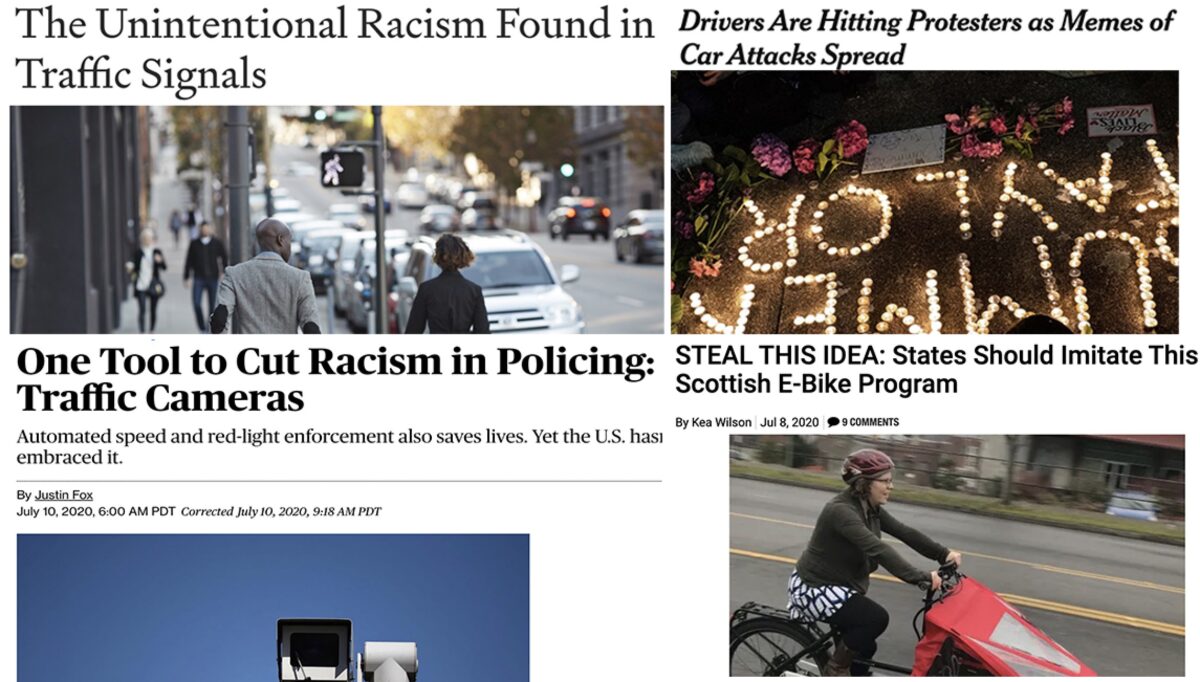
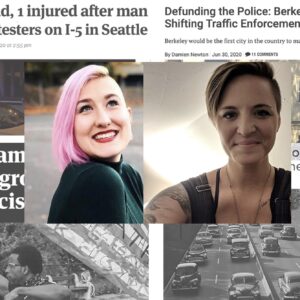
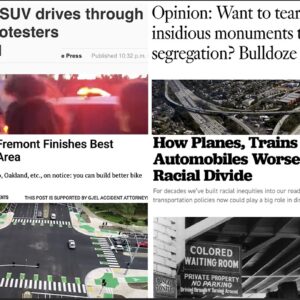
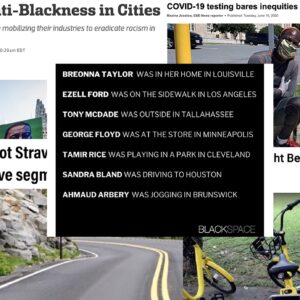
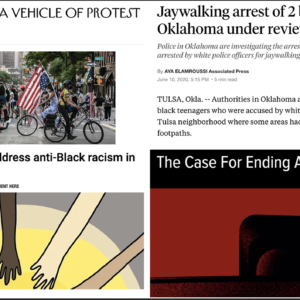
Thanks for reading.
BikePortland has served this community with independent community journalism since 2005. We rely on subscriptions from readers like you to survive. Your financial support is vital in keeping this valuable resource alive and well.
Please subscribe today to strengthen and expand our work.
What color should a walk signal be?
Well, gray of course.
When will the attacks on headlights and light bulbs start? Light and darkness?
Personally, I am offended by stick-people. They make me feel overweight and I am sure it’s because of institutionalized shaming of plus-sized people.
Same as the signal for motor vehicle traffic, green.
‘I thought I had a green light, so I drove through the intersection. Now I realize it was just a walk signal’ – a culpable driver, somewhere.
Right. Which is why we constantly see drivers slamming on their brakes at intersections because the walk guy just switched to the red stop hand, right?
But the STOP hand is really more of an orange, different from traffic signal red. There are now also bike signals that turn the same color green/red as other signals, they are just in the shape of a bike. We could say drivers already have the different shape/same color thing figured out, or we could say that adding yet another shape to the collection of green signals would further confuse already distracted drivers.
Or we could say enough with this nonsense and get on with our day.
Green, to stay consistent with other traffic lights?
Could be mistaken for a green “go” light in relative line of sight with other traffic controls.
I like how they do it in Europe – the traffic signals for drivers are at a lower level on the corner, which makes the driver actually see pedestrians instead of looking forward and center, up high.
I believe MORG is correct. Green was not chosen because it could confuse motorists.
A lot of countries use green color for the pedestrian signal. I’m not siding with the article just stating that a lot of places outside the US use green.
And they do it in the USA – I’ve seen lots of older signals with a green walk person or it even spelled “walk” – it’s more common on the East Coast.
Or maybe there’s not really a problem that needs to be solved.
Apparently not white. White is now bad in all its forms. Who knew a color could be imbued with original sin racism?
Just an FYI for the writer of that article and for the commentors here: colors of road signage and striping are chosen based on visibility. As many items have a dark background, like roads and the back of electronic signs, there is limited color palette that shows up well in all circumstances. Typically the most noticeable colors are white, yellow & red. Additionally, when the colors for such items were being chosen, certain pigments did last very long in the sun, like purple, light blue, etc. so that is why other highly visible colors were chosen.
Before you offer an FYI to the author, you might want to read his article. It’s pretty clear that he understands this..
I did.
He finds out all this history and the logic behind the symbol’s color. That right there should have been the moment the logic > emotions light when on, but it didn’t. Look above our comments. Its people thinking there is a need to recolor traffic signs because (apparently) an entire color and its shades have been “cancelled”. The problem is that the foundation of that discussion, that is, the “white man” is bad removes all the reasons (and history) and replaces with a belief. The problem isn’t some road sign, its that a) too many people still believe races exist (including supposedly woke people) and b) we all wasted time/effort thinking about a road sign vs. deep systemic racist things that need reform NOW.
Nah, we should replace all of the traffic control devices in the country because a few people are offended by them.
Nah, we should replace every driver’s vehicle with even the most inept current model of self driving car.
Technology will improve but history shows that human drivers are incapable of any improvements.
Nothing is foolproof because fools are so ingenious.
Cyclekrieg, another way to look at it might be this…
All that history and logic and planning somehow failed to foresee and/or consider the inevitability that the final product would communicate a message that looks a lot like “white man = GO”. I don’t think it’s such a stretch for some folks to think that might fall under the “deep systemic racist things” umbrella.
In a world in which some people think it is reasonable to believe that Hillary Clinton is holding children prisoner and exploiting them in the basement of a Washington DC ping-pong themed pizza parlour, I think it would be difficult to foresee any number of messages that might be “communicated” by seemingly innocuous devices and designs.
Since I really enjoyed the article, and especially the earnestness with which the author tackled a subject so obviously doomed for failure, I would love to know what else lives under that umbrella. I want to read more.
Not sure I see how the convoluted internet conspiracy theory you mentioned relates to the design and interpretation of traffic signage symbology. You seem to be suggesting that it would have been really tough to predict in advance that people might see this icon of a man rendered in white lights and refer to it as a “white man”. It seems to me that had anyone really given it any thought, it would’ve been obvious.
People see what they want to see, but it doesn’t mean it’s there.
Yes, I am suggesting that I don’t think many reasonable people would seriously consider the ubiquitous walk signal to be racist, (and especially not at the time it was designed, in a rapidly fading past where rational thought often prevailed), just as I don’t think many reasonable people would have shown up at Comet Ping Pong with an assault rifle intending to liberate the captive children. Both are signs of looking too hard for a signal in random noise coupled with a lack of critical thinking.
That said, I do feel a bit uneasy letting Trump’s omnipresent orange hand telling me when not to cross the street. Don’t tell me that’s just coincidence!
The comparison you’re making seems so over the top to me. On one hand, you’re giving examples of people “seeing what they want to see” in the most outrageous and unfathomable ways – leaps of logic that would take years of therapy to unravel. And on the other hand, you’re drawing a comparison to this “WALK” symbol in order to portray the feelings of the article’s author as being equally or similarly outrageous. But it’s not nearly the same sort of unpredictable and circuitous connecting of dots. It’s literally a little white man.
I’m not trying to cram this into a tidy nutshell by saying definitively “that sign is racist!”, because my interest isn’t in having a binary right/wrong shouting match. I’m just acknowledging the impact the symbol and its associations have had on some (possibly many) people, because I believe impact matters at least as much as intent.
I’m also not advocating for the immediate dismantling of every offending sign. I do however think it’s worthwhile to listen to other people’s feelings and experiences – especially people of color, when the topic at hand is racism – without trying to discredit them or depict their views as irrational and unreasonable. Perhaps you’re not the sole arbiter of “rational thought” on this subject.
Green of course with Red for Wait.
What about the while lane lines applied on top of black pavement? Outrageous. Eliminate them.
All traffic signs should be replaced with gray-on-gray instead of the mix of black-on-white, white-on-green, white-on-red, black-on-yellow, etc.
We should stop using green, yellow, and red signal heads on traffic signals. Pick one neutral color for them all.
And for goodness sake, what’s with white headlights? Turn them all off!
The signal is obviously a man, too. Can’t we have a gender-neutral image?
I’ve seen it in Europe, I can’t remember where – it was similar to what you see on neutral-gender toilets – half a “man” stick figure, the other half with a kilt.
How is a half-kilted/half-panted man gender neutral? Maybe it was a bathroom for the fashion-challenged?
Puce and mauve.
You forgot to include the link in “Traffic signals and racism” news story.
Sorry. Added it. Here’s the article –> https://level.medium.com/the-unintentional-racism-found-in-traffic-signals-b2899c34fefb
The article did not include even a shred of evidence that jokes/memes about running people over has led to any incident in real life.
I think they are disgusting and provocative, but no more so than the jokes about guns we’ve lived with for decades that no one blames for shooting deaths. And the more upset they make people, the more attractive producing more will be for those who like that sort of thing.
I don’t think the evidence will ever rise to your standard, however.
That sounds like evidence that people inclined to ram protesters with their cars sometimes share disgusting images online. But my main point was that the article did not say what it was purported to.
Cameras can help: Another top-down master planning idea that is killed by local advocacy. “The National Highway Traffic Safety Administration has become a big fan of speed cameras — but the NHTSA doesn’t make traffic laws; state and local governments do.” Welcome to our federal form of government. From what I recall, Portland is the only city the state of Oregon allows to have such cameras, and very few of them. Apparently they are banned outright here in NC.
Not having top down planning is how you end up with Portland. Portland is a terrible place to walk, scoot, use a wheelchair or mobility scooter, bike, and drive and it’s largely because PBOT absolutely refused to adopt city wide transit plans. Every bike route has major holes in it, every walking route crosses dangerous big streets, there’s tons of inconsistent infrastructure everywhere. It’s a mess and it all comes down PBOT letting the largely white and affluent NIMBYs who attend NA meetings tell them how to build road infrastructure.
IMO based on the tweets in that hashtag, it’s most a handful of (mostly white) planners trying to figure out how to inject themselves into the current discussions on race. The idea that you can’t create safe and healthy environments until racism is gone or that BIPOC folks don’t want safe and healthy environments is nonsense.
If only. NAs have lost almost all power they every had (which was never very much), so your criticism is outdated if it were ever accurate at all.
PBOT has become skilled at “engagement theater”, and generally proceeds as they wish. I’ve been working with my NA for well over a decade trying to convince PBOT to add a crosswalk at a dangerous crossing and improve cycling conditions on some of our streets, and they certainly haven’t been letting us tell them much of anything.
I fully agree with your second paragraph.
The planning profession is just very white in general. I haven’t met too many planners who are not white even in states that are more diverse than Oregon.
That’s certainly true here in NC. Every time I go to a planning or advocate convention, it’s about 90% white here, with an equal proportion of blacks, Asians, and Latinx for the remainder (NC is 65% non-Latinx-white and 21.5% black.) Definitely more men than women too.
E-bike riders per the article are more “risk averse”, yet are 5x more likely to file a claim for accidental damage (just bike and rider accident) than theft. So, they may be risk averse, but just aren’t good at it?
Well, the article says there’s a belief that e-bike riders are risk averse. The damage may well be caused by the torque of the motor taking the rider off guard from a stop. Not caused by reckless behavior. It happens a lot during e-bike test rides. I have seen older folks return from demo rides all bloodied up. So, the significance of the figure is not what it seems.
Or maybe they are just a lot better at not getting their bikes stolen.
Traffic cameras help in two ways:
() it is drastically less expensive to have more of them
() you can remove police from 99% from the situations where they justify killing a not-white person for some arcane traffic violation.
Honest question: Can you give an example of an arcane traffic violation? Obviously it’s no better or worse when an officer murders a person after pulling them over for a well-known traffic violation, but I’m wondering what you have in mind by “arcane”.
“White urbanism” is part of what brought us the RIP rezoning proposal that City Council is considering. The PSC vote that *barely* endorsed it was polarized along racial lines; opponents were very concerned with further displacement of low-income renters, and further losses of “naturally occurring” affordable housing in Portland that the plan does little to mitigate.
Two of the Commissioners who voted against the project when it was at the PSC (Larsell and Quiñonez) urged the City Council to vote for the project, alongside other additional outside of the zoning code. The vast majority of people of color who testified at City Council were in favor. The Anti-Displacement PDX coalition testified in support of the project, with a letter that that was endorsed by APANO, PAALF, OPAL and the Cully Housing Action Team.
The opposition to the Residential Infill Project is overwhelming white (and older) and mostly coming from the city’s more affluent neighborhoods.
Why did those two commissioners vote against the project if they wanted council to pass it? Did they change their mind, or was there a broader strategy at work?
I could only find a draft of the Anti-Displacement PDX letter, which doesn’t sound particularly supportive (“the current draft of the RIP does not meet ADPDX’s expectations for how a major planning initiative must address questions of equity, inclusion, displacement prevention, and housing opportunity”); perhaps the final version was more positive.
The language that you’re quoting is from a 2017 letter (https://sightline-wpengine.netdna-ssl.com/wp-content/uploads/2019/02/ADPDX-RIP-Discussion-Draft-letter-copy.pdf). Many of their recommendations were adopted into the proposal that passed the PSC (i.e. allowing the policy to apply citywide; adding bonuses for affordable housing). Here is the 2020 Anti-Displacement PDX letter: https://www.portlandmaps.com/bps/testimony/item.cfm#proposal=rip&itemID=83044
Here is Quiñonez’s testimony to City Council, where she explains her position: https://www.portlandmaps.com/bps/testimony/item.cfm#search=daisy&itemID=83208
Damn, lots of racists read this blog apparently.
Isn’t it a positive development that we are having an honest discussion where different views can be openly brought out into the open?
For some people, it’s easier to throw out ad hominems than to be objective and rational about things…or listen to another viewpoint that is not 100% in line with their own.
Objectivity is often just bad faith arguments made by racists
Sweeping, general accusations of racism are often just smug virtue-signaling by folks imagining themselves to be “woke”.
If you really want people to understand, point to specific things. How is a specific claim of objectivity really just thinly-veiled racism? Is it racism, or just being blind to privilege? Are those two things the same? For people who truly believe they “don’t have a racist bone in their body”, what is the stair-step of understanding privilege, “unintentional” racism, confronting implicit bias, coming to terms with the notion that anyone in a “power” group is probably at times racist, misogynist, classist, what-have-you-ist—but it’s OK to “own” those things and work to improve? I guarantee the first step is not calling a random stranger a racist and then walking away.
Examples?
I realize that if I can’t find them for myself, I’m probably a racist. But keep in mind there are plenty of people who are so inured to the status quo, and have operated under the assumption that they treat all people fairly and with respect–and that if they do that, they are not racist–that to suddenly be called a “racist” without an explanation of what, specifically constitutes the racism they are displaying, merely makes them confused and defensive and doesn’t further any discussions.
I am beyond words how racist this entire set of articles are. Sickning
Ugg This dumb picture we’ve all seen more times than we need to of a white man looking at the back of a white woman while another white woman looks on disgustedly. Why does this dumb pic stand in for meaningful conversation/critique? About transpo policy? It’s sexist and dumb. Stop using it.
It doesn’t!
Geez, talk about “fragility”
Geez, now that is fragility